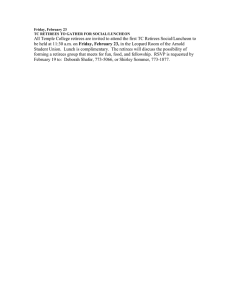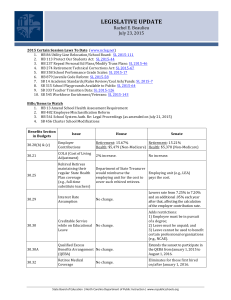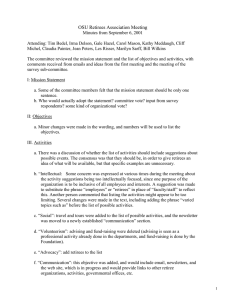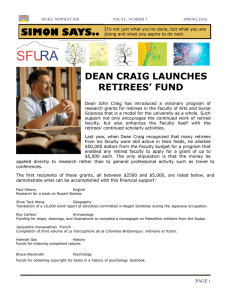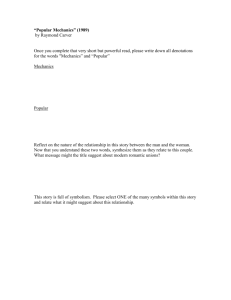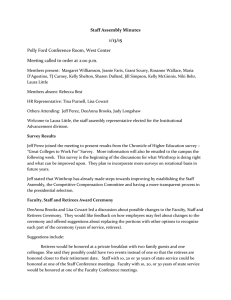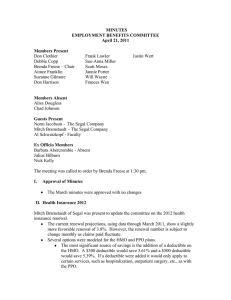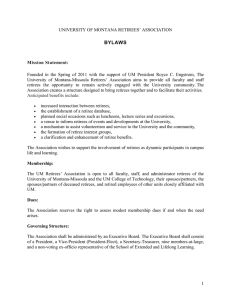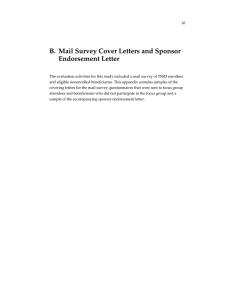Public Reporting Formats That Motivate Older Consumers to Compare Medicare Health Plan Options
advertisement
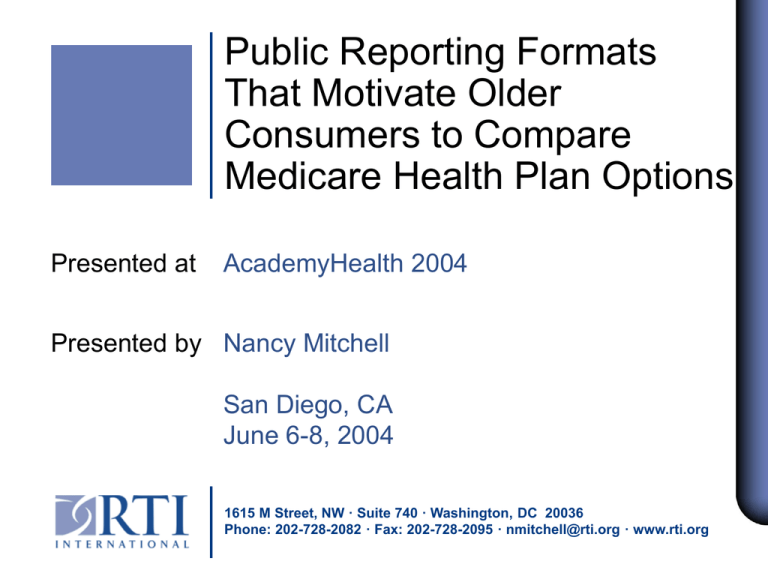
Public Reporting Formats That Motivate Older Consumers to Compare Medicare Health Plan Options Presented at AcademyHealth 2004 Presented by Nancy Mitchell San Diego, CA June 6-8, 2004 1615 M Street, NW · Suite 740 · Washington, DC 20036 Phone: 202-728-2082 · Fax: 202-728-2095 · nmitchell@rti.org · www.rti.org Authors and funding 2 Authors: Nancy Mitchell, BA Elizabeth Frentzel, MPH Jennifer D. Uhrig, Ph.D. Peyton Williams, BA Philip Salib, BA Lauren Harris-Kojetin, Ph.D. Supported by grant number R18 HS11008 from the Agency for Healthcare Research and Quality Rationale for the study 3 Approximately 200,000 persons age into Medicare every year Complex health care market Health and financial consequences of an uniformed choice Benefits of using comparative quality information Employers are in a position to counsel Medicare-eligible employees and retirees No standard method across employers to accomplish this Current materials do not integrate cost, benefits, quality and rules Current materials are very detailed Research Objectives 4 To develop, test and evaluate integrated print- and web-based materials to assist pre-Medicare employees and retirees in choosing a Medicare health plan Conducted formative research Developed, cognitively tested and evaluated materials This presentation will focus on the development and cognitive testing of the materials Theoretical Application 5 Prochaska and DiClemente’s Stages of Change Model People are in 1 of 6 different stages of change Target audience in a pre-contemplation or contemplation stage Developed three products to help move target audience to action stage Theoretical Application con’t 6 Bettman’s Cognitive Information Processing Model Limited ability to process information Kept information concise Selected content based on what consumers report as most helpful for choosing a health plan Sensitive to reading level and format style Methods Materials reviewed by consumer reporting experts 5 rounds of cognitive testing interviews conducted with 48 employees and retirees 7 Ages 58 – 64 In Oregon, North Carolina, and Washington, DC Materials revised after each round of review and testing Product 1: Bookmark 8 Product 2: Booklet 9 Product 3: Booklet and Interactive Website 1 Principal Findings Mechanics of the Presentation 1 Liked the idea of receiving bookmark prior to the other products Preferred photographs of people within their age range Had difficulty understanding generic descriptions of health plan options Principal Findings (con’t) Mechanics of the Presentation 1 Had difficulty understanding differences in cost Liked the look and layout of products Used the worksheet to track factors influencing their decisions Trusted the information Principal Findings (con’t) Plan Choice 1 Reported that products were easy to use Understood the quality data Wanted information about whether their doctor participated in plans Implications for Policy and Practice Mechanics of the Presentation 1 Remove descriptions of generic plan types Present only key elements of cost data Keep information concise and eliminate non-essential details Implications for Policy and Practice Plan Choice 1 Enable employees and retirees to make a more informed plan choice Materials reduce complexity of factors to consider and make the decision more manageable Facilitate use of comparative information

